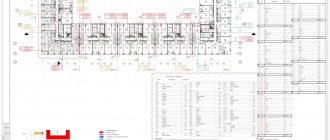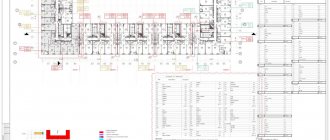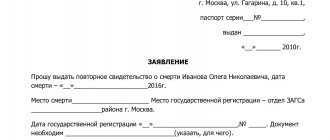The need for registration
In the Russian Federation, providing housing for disabled children is one of the areas of state policy in the field of social protection of the population. Families raising children who are officially recognized as disabled based on medical reports can count on improved living conditions.
The right to improve housing conditions and provide living space for disabled children can be guided by Article 17 of the Federal Law No. 181 of November 24, 1995. In this case, registration is necessary. Russian legislation provides that the acquisition of priority rights to housing for disabled children is available to those citizens who registered as such before January 1, 2005.
Important! People who apply for benefits before the specified period can count on receiving funds from funds established for this purpose or from housing.
Many people are interested in the question of how to get an apartment for a disabled child after January 1, 2005. In this case, all actions will be regulated by the Housing Code of the Russian Federation.
The following indicators are very important:
- time of registration;
- queue number;
- availability of rights to priority receipt of residential premises.
Out of turn, residential premises can be purchased by disabled children living in social service organizations and who are orphans or children without parental care upon reaching 18 years of age. At the same time, the individual rehabilitation program for such a child must stipulate that he can perform self-care and lead an independent lifestyle.
In addition, disabled people and families that include disabled people have the right to priority receipt of land plots for individual housing construction, farming and gardening.
The first priority may be in children if their disease is associated with severe chronic forms. These categories are specified in the LCD and, for example, may include:
- abscess or necrosis of the lungs;
- malignant tumors;
- a number of mental illnesses;
- severe skin lesions;
- active tuberculosis and other diseases specified in Order of the Ministry of Health of Russia dated November 29, 2012 N 987n.
The Housing Code also provides for the right of priority receipt of housing for citizens (including disabled children) whose residential premises are duly recognized as unfit for habitation and cannot be repaired or reconstructed.
Download for viewing and printing:
Federal Law of November 24, 1995 No. 181-FZ “On the social protection of disabled people in the Russian Federation”
Housing Code of the Russian Federation dated December 29, 2014 N 458-FZ
Who is disabled?
Disabled people are people who have a health disorder with a persistent disorder of body functions, leading to limited life activity.
Disability can occur as a result of congenital or acquired pathology of any of the body systems (disease, consequence of injury). As a result of the defect, a particular individual ceases to fulfill his role in society corresponding to his age, gender and social category.
Today, Russian legislation contains many legal documents related to disability.
A number of these documents describe the conditions for assigning a citizen the status of “disabled” and the procedure for determining his disability group.
Conditions for assigning disability
According to the existing classification specified in Decree of the Government of the Russian Federation No. 95, there are 3 groups of disability and the concept of “disabled child”, which differ from each other in the severity of the disease or deviation.
The conditions for group assignment are as follows:
- The human body has a serious health disorder with a persistent disorder of body functions caused by congenital or acquired defects, injuries, and serious diseases.
- A person needs social protection, including rehabilitation and habilitation.
- Limitation of life activity (complete or partial loss of the ability to move, communicate, care for oneself, control oneself, etc.).
Specialists of a special medical examination have the right to recognize a person as disabled, a referral for which can be obtained from a pension fund, a department of social protection of the population, or from a medical organization from the attending physician.
It happens that a citizen is denied a referral for an examination, then he can contact the expert bureau independently. Citizens who have received the status of “disabled” apply for a number of benefits from the state, including material support, transport benefits, reduced tax burden, etc.
In addition, the Government is committed to providing housing for disabled people in need of accommodation.
Download to view and print
Decree of the Government of the Russian Federation dated February 20, 2006 No. 95
Legislative regulation
The law of the Russian Federation has invented a special system that allows families with disabled children to purchase housing.
The right to improve housing conditions and provide living space for disabled children can be guided by Article 17 of Federal Law No. 181, which was adopted on November 24, 1995. For those who were registered after 01/01/2005, housing squares are issued in accordance with Article No. 57 of the Housing Code.
Living space for a disabled child in terms of standards
At the federal level, there is no specific value for the minimum size of housing that can be provided to a disabled person. This right is granted to local authorities. The number of square meters is affected by various conditions. So, for example, in Moscow, 18 sq.m. are allocated for one person who falls under the category of a disabled person. minimal.
Important! In other regions of Russia there may be other regulatory indicators, which can be found in local legislative acts.
Is it allowed or not?
Disabled children include persons under 18 years of age. Childhood disability can be established later than adulthood if there are medical grounds and the appropriate timing of the onset of the disease has been established.
By law, a family raising a disabled child has the right to receive a free allotment of land from the state. At the federal and regional levels, programs have been developed to help improve the living conditions of disabled children.
The right to free receipt
is granted to the parents of a child whose capabilities are limited as a result of:
- serious illness;
- defect from birth;
- suffered trauma.
If a family is raising three or more children, including a disabled person, the territory will be allocated free of charge. If a family does not have many children, it is given the right to purchase land without participating in an auction.
The allocation of an allotment is made once - it will not be possible to re-exercise the rights. But if the territory has fallen into disrepair for reasons beyond the control of the person (earthquake, landslides, etc.), the family has the right to apply for the benefit again.
Disabled children are allocated free areas that are not encumbered by the actions of third parties. Parents, guardians or adoptive parents can exercise the right and represent the interests of the child.
Additional Information! If the family did not manage to receive the allotment before the child came of age, he has the right to re-apply.
Collection of documentation for benefits
Before obtaining housing for a disabled child, you need to collect a certain package of documents and submit it to local authorities.
The list of documentation includes the following:
- passport of a citizen of the Russian Federation;
- statement;
- an extract issued by Rosreestr, if there are already residential premises;
- an extract from the house register or a certificate of family composition;
- a document confirming the existing disability and related documents;
- marriage or divorce document and other documents confirming the degree of relationship.
The list of required documents for registration as those in need of improved housing conditions may vary depending on the region of residence, since local authorities independently develop a methodology for accepting citizens into the queue.
There are also frequent cases when confirmation of disability is completely refused. Then it is necessary to appeal the decision in court.
Attention! Submission of documents can be carried out by legal representatives of the beneficiary. Any officially authorized persons have the right to do this. To do this, you need a notarized power of attorney, which will clearly state this right.
Reasons for providing
The allocation of a plot is made regardless of the disability group assigned to the citizen . Persons with limited working capacity of groups 1, 2 and 3 and disabled citizens are provided with equal conditions, since nothing else is stipulated in legislative documents. The main thing is that the disability be assigned on a permanent and not temporary basis . If the disability is temporary, the decision is made by the administration based on the diagnosis and material standard of living of the applicant for the pension.
As a rule, the limitation on work ability is established by the ITU for one year. If such a citizen has joined a queue that has been moving forward for more than a year, and during this time has not passed a re-examination, then the administration has the right to exclude him from the list of beneficiaries, transferring him to the queue of participants applying for a pension on other grounds (for example, providing a pension for a young families or large families). Either - he will offer to buy out the land plot at the cadastral value or rent out the plot.
If an applicant for the acquisition of land plots belonging to this category registers with the administration in order to take part in the auction, he is alienated from priority in receiving the plot and is allowed to purchase on a general basis, by purchasing and selling the plot from the administration - the organizer of the auction. A ban on participation in auctions for this category of persons is unacceptable, since in addition to the benefits that these citizens can receive, they retain the right to equal participation of the population in the acquisition of real estate.
Who can apply for living space
Only the presence of a minor family member with a disability cannot become an unconditional basis for receiving residential square meters.
It is very important to be exactly the family that needs improved living conditions. In this case, the authorities dealing with the issue of providing housing for disabled people rely on the Rules prescribed by the Housing Code (Article 51).
Circumstances that entail the right to preferential conditions include:
- the lack of housing for a disabled child or a member of his family, owned by right of ownership or under a social tenancy agreement;
- the area of residential premises that belongs by right of ownership to a disabled child or a member of his family or is rented is less than the accounting norm for one family member;
- the residential premises do not meet the requirements established for residential premises;
- Several families live in the apartment, one of whose members is sick, suffering from a severe form of chronic disease, in which living together with him is impossible. At the same time, the needy family should not have any other housing owned or leased.
Disabled persons are not included in a separate list of persons who are eligible for rental housing out of turn. They receive such housing on a first-come, first-served basis.
We discussed cases when a disabled child can qualify for housing out of turn. These include:
- the achievement of 18 years of age by a disabled child in a social service organization and the ability to independently manage everyday life as prescribed in the individual rehabilitation program;
- the housing in which a disabled child lives is unsuitable for habitation and cannot be repaired or reconstructed;
- a disabled child or a member of his family suffers from a severe form of a chronic disease.
Even without taking into account all the bureaucratic procedures, the Russian Federation, represented by its government bodies, must create comfortable conditions for people with disabilities:
- the presence of ramps or special lifts for wheelchairs in public places and residential buildings;
- provide assistance in relocating citizens with disabilities and their families to the first floors of houses, etc.
This is very important for the full functioning of society.
Download for viewing and printing:
Decree of the Government of the Russian Federation of July 27, 1996 No. 901
The procedure for obtaining land for disabled children and their families
As mentioned earlier, the state, which protects the rights of people with physiological and psychological health problems, additionally gives them a guarantee for the allocation of part of the land. This right can only be exercised once.
But there is an exception here: once again, you can use the preference in question in the case when the allotment can no longer be used or for some reason it does not exist. For example, this happens during a flood, earthquake, landslide or other incident. The loss of land should be recorded in a document.
You should also know that according to the law, the executive authority or local government has an obligation to issue a land plot to a disabled person that is not subject to restrictions and encumbrances.
According to current legislation, the transferred territory must have a clear boundary, but even if it is not established, this is not a reason for refusing to provide an allotment to a citizen with disabilities. In this case, the municipal authorities carry out surveying of the site and its cadastral registration.
To obtain a property, the applicant must contact the authorities with the appropriate request and a package of documents. If a disabled child was provided with land not for his own possession, but under a lease agreement, it is important to construct a residential building on the site within three years. If this requirement is not met, the plot will be confiscated and the right to land will be cancelled, that is, the disabled person will no longer be able to claim the land plot in the future.
It is noteworthy that each region can set its own limit on the allocated area, but taking into account the minimum established sizes. In particular, a citizen with disabilities may be allocated:
— 0.04 hectares for a garden or vegetable garden;
— 0.15 hectares for livestock farming.
In the regions they provide:
- 0.10 hectares for the construction of your own house;
- 0.12 hectares, if you plan to build a summer house or garden;
— 0.15 hectares for livestock and gardening, as well as personal farming.
For what purposes is it provided?
Other uses:
- dacha management,
- construction of a garage or other non-residential building,
- subsidiary farm.
On land for individual housing construction, it is allowed to build a house with a height of no more than three floors.
If the building is registered, people are allowed to register in it.
On a plot allocated for private household plots, it is allowed to erect a residential building if the plot is a personal plot.
Field storage is used only for growing agricultural structures. The territory for agricultural purposes is included in the composition of a vegetable gardening partnership or is used individually, without joining the commonwealth.








